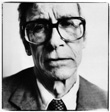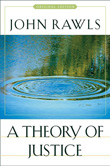 A cruel, silly but not entirely inaccurate way of defining A Theory of Justice, the central work in the philosophy of John Rawls (1921-2002), is to call it the greatest book nobody has ever read. Since it was first published in 1971 the book has had an enormous influence throughout the West and in most of the East that aspires to democracy, but it is hard even to quote from, let alone summarise. Most students of modern history know that Rawls invented the Difference Principle but few of them would find it easy to explain. With his emphasis on fair distribution through state initiatives, Rawls’s initial appeal is mainly to the left, but left-wing thinkers usually do a bad job of summing him up because they find his acceptance of capitalism reactionary and his tolerance of social discrepancies unpalatable. (One way of encapsulating the Difference Principle, indeed, would be to say that any discrepancy is tolerable unless it brings disadvantage to the worst off.) Trying to get an explication of Rawls into a short book, his commentators sometimes manage to be even more difficult than their subject: Thomas Pogge’s John Rawls is an example. But on an even shorter scale, and much more approachable, there is an excellent article emanating from further to the right.
A cruel, silly but not entirely inaccurate way of defining A Theory of Justice, the central work in the philosophy of John Rawls (1921-2002), is to call it the greatest book nobody has ever read. Since it was first published in 1971 the book has had an enormous influence throughout the West and in most of the East that aspires to democracy, but it is hard even to quote from, let alone summarise. Most students of modern history know that Rawls invented the Difference Principle but few of them would find it easy to explain. With his emphasis on fair distribution through state initiatives, Rawls’s initial appeal is mainly to the left, but left-wing thinkers usually do a bad job of summing him up because they find his acceptance of capitalism reactionary and his tolerance of social discrepancies unpalatable. (One way of encapsulating the Difference Principle, indeed, would be to say that any discrepancy is tolerable unless it brings disadvantage to the worst off.) Trying to get an explication of Rawls into a short book, his commentators sometimes manage to be even more difficult than their subject: Thomas Pogge’s John Rawls is an example. But on an even shorter scale, and much more approachable, there is an excellent article emanating from further to the right.

In The American Conservative for July 28, 2008, David Gordon published “Going off the Rawls” (the awful title was no doubt the brainwave of the editor) which does an admirably clean job of laying out Rawls’s arguments in a clear linear fashion which their inventor never quite managed to attain. A convinced small-government Republican, Gordon is much more of an adversary to Rawls than a fan, but he pays Rawls’s dignity the respect which is its due. Gordon’s article, which can be reached from here, is a doorway into a building in which readers might well subsequently become lost, but they should know that it is there. In my own view, for what it is worth, Rawls was a great man. He came back alive from the Pacific War after seeing many of his generation die young, and he wanted to define what they had been fighting for, and further its continuance. A quick way of highlighting his superiority as a political philosopher to, say, Noam Chomsky, would be to point out that although Chomsky could describe all the global ills produced by American injustice, Rawls could bring an intellectual rationale to the America that produced Chomsky.
Read David Gordon on John Rawls
(Photo by Steve Pyke)




 A cruel, silly but not entirely inaccurate way of defining A Theory of Justice, the central work in the philosophy of John Rawls (1921-2002), is to call it the greatest book nobody has ever read. Since it was first published in 1971 the book has had an enormous influence throughout the West and in most of the East that aspires to democracy, but it is hard even to quote from, let alone summarise. Most students of modern history know that Rawls invented the Difference Principle but few of them would find it easy to explain. With his emphasis on fair distribution through state initiatives, Rawls’s initial appeal is mainly to the left, but left-wing thinkers usually do a bad job of summing him up because they find his acceptance of capitalism reactionary and his tolerance of social discrepancies unpalatable. (One way of encapsulating the Difference Principle, indeed, would be to say that any discrepancy is tolerable unless it brings disadvantage to the worst off.) Trying to get an explication of Rawls into a short book, his commentators sometimes manage to be even more difficult than their subject: Thomas Pogge’s
A cruel, silly but not entirely inaccurate way of defining A Theory of Justice, the central work in the philosophy of John Rawls (1921-2002), is to call it the greatest book nobody has ever read. Since it was first published in 1971 the book has had an enormous influence throughout the West and in most of the East that aspires to democracy, but it is hard even to quote from, let alone summarise. Most students of modern history know that Rawls invented the Difference Principle but few of them would find it easy to explain. With his emphasis on fair distribution through state initiatives, Rawls’s initial appeal is mainly to the left, but left-wing thinkers usually do a bad job of summing him up because they find his acceptance of capitalism reactionary and his tolerance of social discrepancies unpalatable. (One way of encapsulating the Difference Principle, indeed, would be to say that any discrepancy is tolerable unless it brings disadvantage to the worst off.) Trying to get an explication of Rawls into a short book, his commentators sometimes manage to be even more difficult than their subject: Thomas Pogge’s 